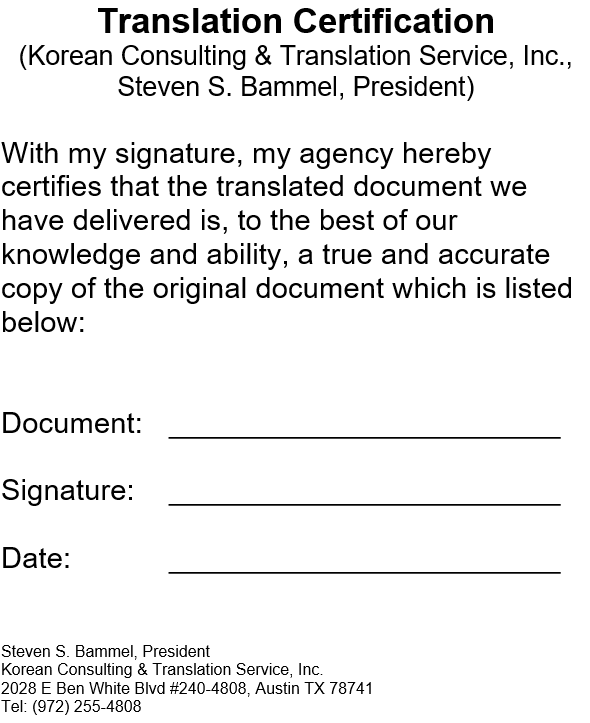Get the assurance you need with certified Korean translation.
I provide several levels of certification through my company for the translation work I handle. Discuss with me about your translation certification requirements up-front and I will do my best to meet your needs for translation certification and notarization.
Read below for details on:
- The four levels of translation certification I provide
- My standard translation certification template
- Important conditions and limitations for providing certification
“Steven… The translation looked good, and I’d like to thank you for being able to accommodate the short notice. I look forward to doing business with you again, hopefully sometime soon. With best regards,”
Tero Taipale (Project Manager, Intralink Korea – Seoul, Korea)

Four levels of certification
I offer four certification levels for the Korean translation services I provide through my company. Level 1 is free; the others may involve an additional charge (especially with hardcopy delivery and/or notarization). Therefore, be sure to check with me in advance if certification is important to you.
Level 1 – No certification
You may not need any extra certification at all. In fact, even without a signed certification statement, my company stands behind our work with our “Consistently Good Work” Pledge. Standard translation quotes assume that the Pledge provides you with the assurances you need and that you do not require a separate certification statement.
Level 2 – Standard certification
My standard certified Korean translation is based on the template below. Upon delivery of my Korean translation to you, I will sign the template as president of my company, and scan and email the certification to you.
Level 3 – Certification with hardcopy delivery
After signing, scanning, and emailing you the standard certification, I can also send you the original, signed certification in hardcopy form.
Level 4 – Certification with notarization and hardcopy delivery
Finally, I can provide notarized service from a Texas notary or through an online notary (such as Notarize.com or NotaryCam.com) of the certified Korean translation and send it to you in hardcopy format. I cannot provide notarized Korean translation from a Korean notary, but I can deliver notarized certifications internationally. You should check in advance whether one of my notarization options will serve your needs in your jurisdiction.
Standard certification template
The following is the standard certification I provide for translations delivered. If you need a different wording or form, be sure to ask me about it before the project starts.

Conditions for certified Korean translation
I (Steven S. Bammel) am the sole owner of Korean Consulting & Translation Service, Inc. (a Texas corporation) and I also work as president of my company. Even though I am the only full-time employee of Korean Consulting & Translation Service, Inc., all contracting for the services my company provides (including documents that I personally translate) must still be executed in the name of my company.
All certifications for work performed must be issued in the name of Korean Consulting & Translation Service, Inc. When certifying translations, I sign for my company in my capacity as president, but neither I nor anyone else I work with can or will certify anything for anyone in a personal capacity.
Korean Consulting & Translation Service, Inc. will only issue certifications for certified Korean translation to the client who contracted Korean Consulting & Translation Service, Inc. for work or in a generic “To whom it may concern” format. My company will not issue certifications directly to our client’s client or to anyone else with whom my company does not have a contractual relationship.
My company will only certify the actual work we performed, including the files (and file names) that we directly handled and delivered to our client. We cannot certify different files (or file names) that our client says they received from us and then delivered to their client.
Every certification regarding the correctness of a translation must include wording to the effect of “to the best of our knowledge.” My team and I are human and we sometimes make mistakes; in addition, correctness is sometimes a judgment call. We cannot simply certify that a translation is “correct”.
We are under no obligation to certify anything that isn’t agreed to in the terms launching the project. Therefore, if certification is important to you, be specific about your requirements before project commencement so that I can clarify for you what we will be able to provide.
